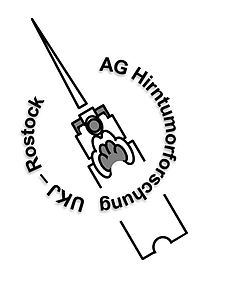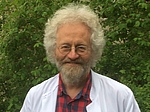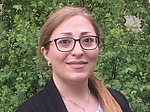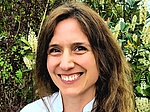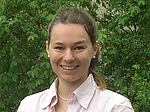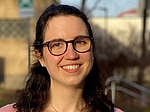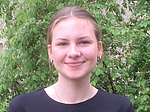Brain Tumor Research Group
Brain Tumor Research Group and Lymphomas
Brain tumor biobank
Substance testing using patient derived tumor models
Development of experimental brain tumor therapies using „Organ on a Chip“ and animal models
miRNAs in Burkitt lymphomas
Working Group Head:
Prof. Dr. med. Carl Friedrich Classen
carl-friedrich.classen{bei}med.uni-rostock.de
Lab Head:
Dr. rer. hum. Fatemeh Shokraie
Fatemeh.shokraie{bei}med.uni-rostock.de
Lymphoma Section Head:
Dr. med. Teresa Cardesa Salzmann
TeresaMarta.CardesaSalzmann{bei}med.uni-rostock.de
Doctorate Students:
cand. med. Julia Faerber
Katharina del Moral, physician
Anna Sophie Schulz, physician
Technical Aid:
stud. nat. Caroline Köhn
Cooperation Partners:
PD Dr. rer. nat. Claudia Maletzki
Zentrum für Innere Medizin, Medizinische Klinik III, Rostock
Dr. med. Björn Schneider
Institut für Pathologie, Rostock
PD Dr. rer. nat. Tomas Fiedler
Institut für Medizinische Mikrobiologie, Virologie und Hygiene, Rostock
Prof. Dr. med. F. Freiman, PD Dr. Dr. F. Gessler, Dr. med. D. Dubinski
Klinik und Poliklinik für Neurochirurgie, Rostock
Dr. med. D. Koczan
Institut für Immunologie der Universität Rostock, AG Molekulare Immunologie
Prof. Dr. med. B. Krause
Klinik und Poliklinik für Nuklearmedizin, Rostock
PD Dr. rer. nat. Michael Linnebacher
AG Molekulare Onkologie, Chirurgische Klinik und Poliklinik der Universität Rostock
Prof. Dr. med. Holger Lode
Abt. Allgemeine Pädiatrie / Pädiatrische Onkologie und Hämatologie, Greifswald
Prof. Dr. med. S. van Gool, M.D., Ph.D.
Medizinische Leitung der Translationalen Onkologie, Immunologisches Onkologisches Zentrum Köln
Dr. med. Caterina Redwanz,
Klinik für Innere Medizin B, Kardiologie, Universitätsmedizin Greifswald
Prof. E. Campo, MD PhD
Institute of Pathology, University of Barcelona
Itziar Salaverria, PhD
Institute of Pathology, University of Barcelona
Completed Doctorate Theses:
Dr. med. Till Fadenholz
Dr. rer. nat. Christina Mullins
Dr. med. Anne Pichorner, geb. Enders
Dr. med. Julia Würtemberger, geb. Schubert
Dr. med. Poroshista Mokri
Dr. med. Madlin Walther
Dr. rer. nat. Doreen William
Dr. med. Charlotte Linke
Dr. rer. nat. Christin Rieß
Research focus
Brain tumors represent about 20 % of malignant diseases in childhood, and among these, about 20 % are so-called highly malignant gliomas, in particular glioblastomas (GBM, °IV according to the WHO classification) – in adults, with 50% they are even the most common type of brain tumor. These tumors even today are – in spite of radical resection, irradiation and chemotherapy using the alcylating agent Temozolomide – fatal for most of the patients; only 3-10 % survive 5 years. The limitations of standard therapy and the low survival underscore the need for novel and extended therapy approaches.
Brain tumor biobank
In recent years, in Rostock, with the patient’s or their guardians‘ consent, tissue probes of brain tumors WHO °I-IV ware collected to build up a large biobank. Our analyses showed that the molecular genetic properties go along with a high biological heterogeneity, resulting in completely different phenotypes. Patient cells are cultivated both in two dimensional, i.e. 2D – as well as 3D in vitro cell culture models (neuro- as well as stem cell-like spheroids).
Substance testing of patient derived tumor models
Using these patient-individual cell lines, metabolic pathways can be identified as predictive targets, leading to targeted therapies:
The microbial enzyme Arginine Deiminase (ADI)
Arginine represents a semi essential amino acid for a number of cells. Also, a part of our glioblastoma cell lines are Arginin-auxotrophic, making them targetable by specific degradation of this amino acid. The microbial enzyme Arginine Deiminase (ADI), originally prepared from Streptococcus pyogenes (in cooperation with the Fiedler lab), is thus a potential target in the treatment of GBM. In cooperation with PD Dr. Tomas Fiedler and PD Dr. Claudia Maletzki we are currently working on an extended Arginin deprivation approach.
Cyclin dependent kinase inhibitors (CDKi)
Cyclin dependent kinases (CDK) belong to a family of highly conserved serin-/threonin protein kinases and play a significant role in cell cycle regulation, in homeostasis and in normal cell proliferation. Genome analyses showed that significant tumor entities, including GBM, show alterations in CDK-mediated signaling pathways. Accordingly, CDK inhibitors represent a further approach to inhibit das GBM growth effectively.
GD2 antibodies
The disialoganglioside GD2 is highly expressed in neural crest tumors like the neuroblastoma. In pediatric neuroblastoma patients, GD2 not only represents a diagnostic marker but is also the basis for a GD2 targeted therapy option. In cooperation with Prof. Dr. Holger Lode’s lab, Greifswald, we now study how the specific GD2 antibody developed by them may also be a treatment modality in GBM.
Development of experimental brain tumor therapies as „Organ on a Chip“ or animal models
Perspectively, we plan to validate the most promising treatment options in subcutaneous or orthotopic animal models or novel 3D culture „chips“.
Burkitt lymphoma miRNA research
Burkitt lymphoma (BL) is the most common B-cell lymphoma in children and accounts for about 40% of childhood non-Hodgkin lymphomas (NHL). To date, the global microRNA expression patterns of BL have not been extensively interrogated. We are utilizing microRNA arrays and qPCR to explore microRNA expression signatures in Burkitt Lymphoma. Our focus is to correlate these results with clinical and pathological aspects, to gain deeper insight into the molecular mechanisms of this disease.
Publication list Prof. Dr. med. C.F. Classen - hier.

